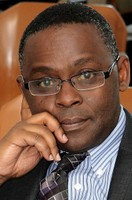 In a written interview with Planet Earth Institute, Murenzi said sustainable development goals now being crafted in a far-reaching global process must include a strong focus on higher education to support problem-solving and innovation. In the Millenium Development Goals that have guided development policy and investment since 2000, important emphasis was placed on elementary education, he said, but universities received too little attention – and too little donor funding. Those needs are especially acute in Least Developed Countries (LDCs), most of which are in Africa.
In a written interview with Planet Earth Institute, Murenzi said sustainable development goals now being crafted in a far-reaching global process must include a strong focus on higher education to support problem-solving and innovation. In the Millenium Development Goals that have guided development policy and investment since 2000, important emphasis was placed on elementary education, he said, but universities received too little attention – and too little donor funding. Those needs are especially acute in Least Developed Countries (LDCs), most of which are in Africa.
"Nations that have few resources typically struggle to develop their universities and laboratories," Murenzi explained. Especially in the LDCs, he added, "science facilities in their universities tend to be so poor that it is not possible to conduct advanced research. As a result of this neglect, aspiring scientists feel they must leave for more scientifically advanced countries. This is very damaging. It limits the ability of science and engineering to solve problems. It hurts education. And it robs young people of opportunities and hope."
The Millenium goals expire after 2015, and the United Nations is leading a global effort to define an effective new set of goals. "TWAS places great emphasis on educating and training PhD-level scientists and engineers," Murenzi said. "They are important to development at every level, and this must be recognized in the goals and policies that emerge from the post-2015 process."
Murenzi previously served as Rwanda's minister of education, science, technology and scientific research. The Planet Earth Institute, based in London, is an international NGO and charity working for the scientific independence of Africa.
Read the full interview with TWAS Executive Director Romain Murenzi.

